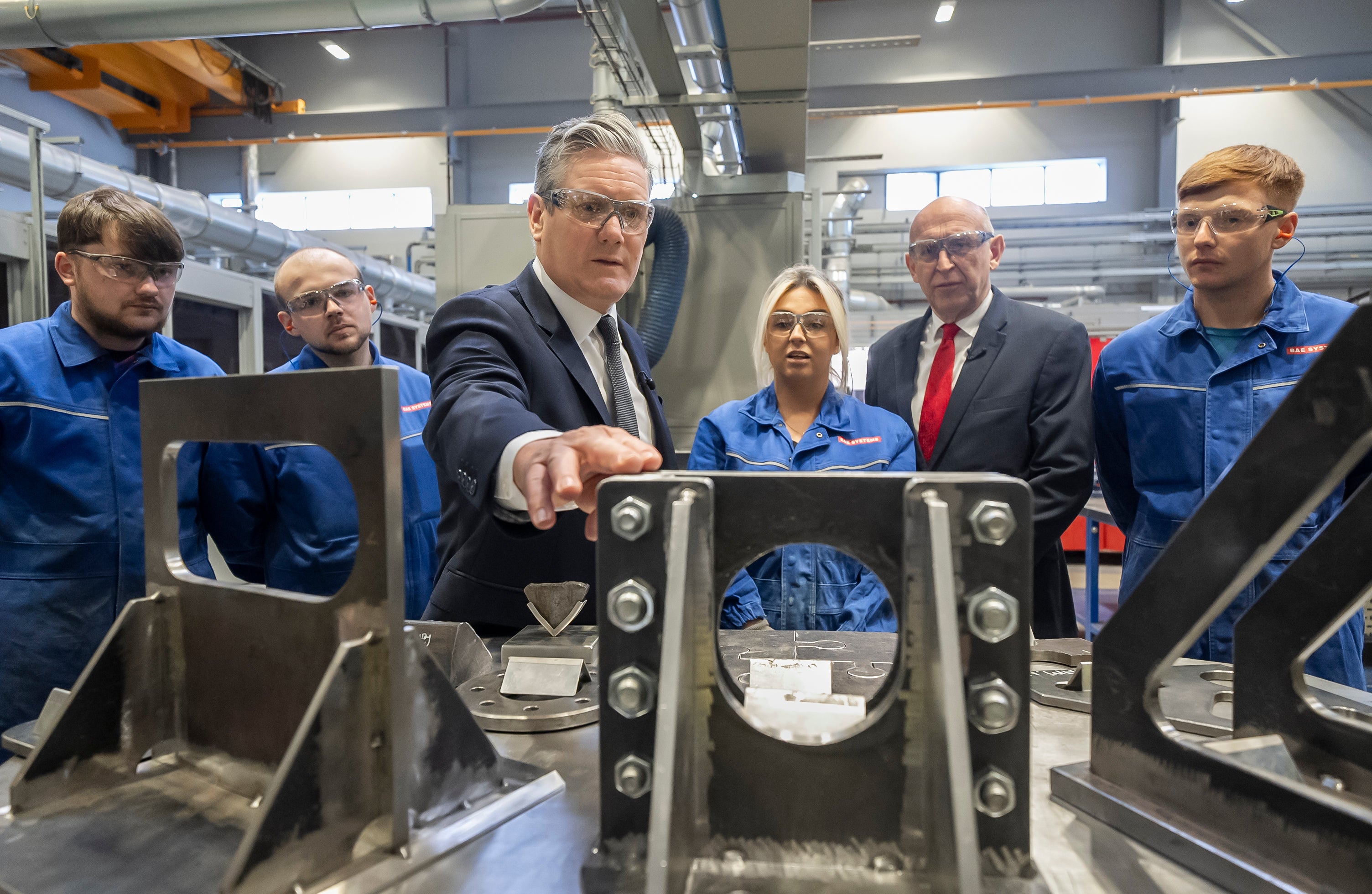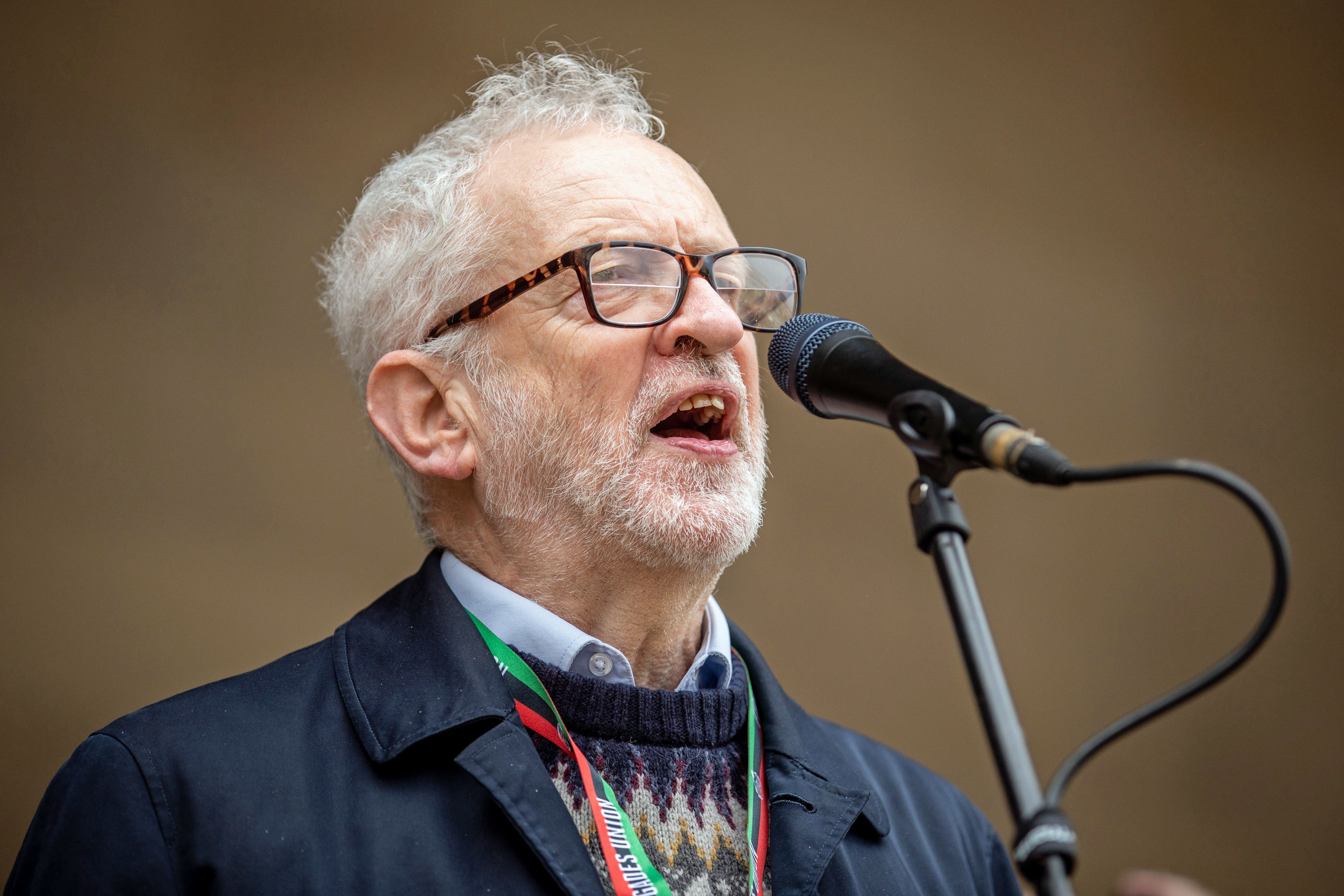What is Labour’s policy around Britain’s nuclear deterrent?
As Keir Starmer takes a decisive line on defence spending, Sean O’Grady examines the Labour Party’s current position and how it compares to that adopted by Starmer’s predecessor


Keir Starmer has parked his tanks on the Conservatives’ lawn again, this time taking a strong line on defence and the renewal of the British nuclear deterrent. Writing in the Daily Mail – which is about as core Tory as it gets – Starmer declared his “cast iron” promise to maintain the country’s nuclear force as a “generational, multi-decade commitment”, stating: “Not only is this about defending our land and our Nato allies, it’s also defending our economy.”
Starmer reinforced his offensive with a tactical visit to the Barrow shipyard, where the new Dreadnought-class submarines are being built, destined to carry Trident nuclear missiles through the 2030s. It’s the first such visit in three decades. In tone at least, it confirms the clean break with Labour’s recent stance on defence policy; and Starmer will be hoping that it will reassure those voters who are still nervous about whether Labour has really changed...
What’s new?
The tone and the visuals, mainly. The message isn’t that new, but the fact is that defence has been a traditional weak point for Labour, in the same way that the Tories always have trouble over the NHS. Starmer, like any leader, is trying to maximise his positives and minimise his negatives – and to live down the past few years, during which Jeremy Corbyn, fairly or not, was portrayed as an appeaser of Russia and something akin to a pacifist. Labour has often been split on defence, and this is another move designed to show how united the party now is.
Is this another Starmer flip-flop?
Yes and no. Yes, in the sense that he did, as the Tories never fail to point out, campaign in two general elections to make the lifelong unilateralist Corbyn prime minister (although Corbyn’s actual policy as leader did not include the unilateral renunciation of the British nuclear arsenal). As leader, Starmer has followed a fairly clear and predictable line on the issue, but as late as 2021 he criticised Boris Johnson in the Commons for increasing the size of the nuclear stockpile, saying that the defence review at the time “doesn’t explain when, why, or for what strategic purpose”.
(As a matter of interest, Angela Rayner and Lisa Nandy have both voted against Trident in the past.)
So Starmer, like most of his colleagues, has indeed been all over the place on nuclear weapons, a proud tradition ever since Labour first split on the issue after it lost the 1959 general election.
Wasn’t Corbyn committed to unilateral nuclear disarmament?
He was as a backbencher, and he has been a fierce critic of nuclear weapons generally. When campaigning for the leadership in 2015, he was asked whether he would use such weapons as prime minister, and replied: “No.” Corbyn was also clear that the UK should not renew Trident, and nor should anyone else have such terrifying weapons of mass destruction: “I am opposed to the use of nuclear weapons. I am opposed to the holding of nuclear weapons. I want to see a nuclear-free world. I believe it is possible.”
However, by the time of the 2019 election, under intense pressure from his parliamentary party, Corbyn’s manifesto read: “Labour supports the renewal of the Trident nuclear deterrent. Labour will also actively lead multilateral efforts under our obligations to the non-proliferation treaty to create a nuclear-free world.” Anyway, Corbyn is no longer a Labour MP.
Will it win Labour any votes? Or lose them?
A bit of both. There may be a small benefit in winning over some floating ex-Tory voters who regard defence as important. On the other hand, especially after the recent divisions over Gaza, some of Starmer’s more left-wing supporters may swing to the Greens as a kind of protest. On balance, in pure psephological terms, it might be a small negative. But it has made him a tiny bit more popular with the Tory press.
Is the nuclear deterrent worth having anyway?
A question that is too little asked. It’s assumed that it helped win the Cold War – and that it is essential in the face of a more assertive China and an expansionist Russia, but of course that’s not necessarily so. The UK nuclear deterrent was irrelevant in the Falklands, Afghanistan, Iraq, and all the other wars and counterterror operations that Britain has had to carry out since the first British atom bomb was detonated in 1952.

It’s also worth mentioning, given the possibility of the return of Donald Trump as US president, that Trident (along with its successor systems) is crucially dependent on American technology, as it has been since Harold Macmillan persuaded President Kennedy that the British, even after some embarrassing spy scandals, could indeed be trusted with US nuclear secrets. Trump probably wouldn’t cancel the Aukus nuclear defence pact with Australia and the UK – a grouping that may soon incorporate Japan – but his frustration with Nato and his willingness to appease Putin are public knowledge.
Would Starmer ‘press the button’?
By the time we find out, it might be too late to pass any judgement about the wisdom of doing so. If Starmer becomes PM, he will be asked, like all of his predecessors, to write “letters of last resort” to the commanders of the British submarines equipped with nuclear missiles. The letters are sealed, and very few people will ever know what’s in them. But Starmer is in favour of authorising the use of such weapons, in principle.
Asked the question last December, Starmer, dressed in combat camouflage, stated: “The nuclear deterrent is very important to us ... Obviously, I’m not going to discuss with you the circumstances in which they may or may not be used, but it is a very important part of the defence of our country that we are strongly committed to, along with our commitment to Nato and to the security of our nation, which is paramount.”
That is identical to current government policy – not committing to any particular “rule of engagement” such as “no first use”, the better to create uncertainty among foes and to enhance the power of the deterrent. For the record, Labour’s plans for defence spending are also similar to those of the Conservatives – a target of 2.5 per cent of GDP. In reality, 2.5 per cent may prove hopelessly inadequate if war spreads from Ukraine and breaks out elsewhere in Europe – even if the UK is only supporting “proxy” forces against Russia.
What do the Conservatives say?
The defence secretary, Grant Shapps, comments that “You can’t trust Labour on this” and claims that many Labour backbenchers are “absolutely against having a nuclear deterrent”.
And the left?
Well, CND is still going, and its general secretary Kate Hudson offers this verdict: “After 14 years of Tory misrule and an election looming, voters are desperately looking for hope from the Labour Party. However, it’s increasingly clear that Starmer’s offer is just more of the same: billions of pounds wasted on nuclear weapons and nuclear power, and a belligerent foreign policy that includes support for the Aukus pact, Nato, and continuing arms sales to Israel, used to kill Palestinians.”






Join our commenting forum
Join thought-provoking conversations, follow other Independent readers and see their replies
Comments